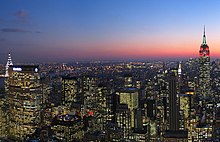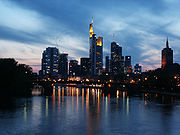Global city




- For a city spanning an entire planet, see Ecumenopolis
A global city (also known as a world city or world-class city) is a city that has a direct and tangible effect on global affairs through socioeconomic, cultural, and/or political means. In recent years, the term has become increasingly familiar, because of the rise of globalization (i.e., global finance, communications, and travel). The term "global city", as opposed to megacity, was first coined by Saskia Sassen in a seminal 1991 work.
General characteristics
Though defining a global city must be partially subjective, these cities are generally seen as sharing the following characteristics:
- International, first-name familiarity (one would say "Tokyo", not "Tokyo, Japan").
- Active influence and participation in international events and world affairs (for example, New York City is home to the United Nations headquarters, Brussels is home to the EU Commission and NATO headquarters, Frankfurt is headquarters to the European Central Bank).
- A fairly large population (the center of a metropolitan area with a population of at least one million, typically several million). An example would be Hong Kong.
- A major international airport (for example, London Heathrow Airport) that serves as an established hub for several international airlines.
- An advanced transportation system that includes several freeways and/or a large mass transit network offering multiple modes of transportation (subway, light rail, regional rail, ferry, or bus). Toronto is an example.
- In the West, several international cultures and communities (such as a Chinatown, a Little Italy, or other immigrant communities). In other parts of the world, such as Asia, cities which attract large foreign businesses and related expatriate communities, for example Singapore, Shanghai, Hong Kong, and Moscow.
- International financial institutions, law firms, corporate headquarters (especially conglomerates), and stock exchanges that have influence over the world economy.
- Advanced communications infrastructure that modern trans-national corporations rely on, such as fiberoptics, Wi-Fi networks, cellular phone services, and other high-speed lines of communications.
- World-renowned cultural institutions, such as museums and universities.
- A lively cultural scene, including film festivals, premieres, a thriving music or theatre scene; an orchestra, an opera company, art galleries, and street performers.
- Several powerful and influential media outlets with an international reach, such as the BBC, The New York Times, Le Monde, Agence France-Presse, and Reuters.
In the Western view, London, New York, Paris, and Tokyo have been traditionally considered the 'big four' world cities – not incidentally, they also serve as symbols of global capitalism. More recent views often add major Asian cities like Hong Kong, Singapore, Shanghai and Beijing, which today look much like New York. However, many people have their own personal lists, and any two lists are likely to differ based on cultural background, values, and experience.
In certain developed countries, the rise of suburbia and the ongoing migration of manufacturing jobs to developing countries has led to significant urban decay. Therefore, to boost urban regeneration, tourism, and revenue, the goal of building a "world-class" city has recently become an obsession with the governments of some mid-size cities and their constituents.
The phenomenon of world-city building, albeit with slightly more success, has also been observed in Sydney, Buenos Aires, Frankfurt, and Toronto: each of these cities has emerged as large and influential.



GaWC Inventory of World Cities
An attempt to define and categorise world cities was made by the Globalization and World Cities Study Group and Network (GaWC), based primarily at Loughborough University in Loughborough, Leicestershire, England. The roster was outlined in the GaWC Research Bulletin 5 [1] and ranked cities based on provision of "advanced producer services" such as accountancy, advertising, finance and law, by international corporations. The GaWC inventory identifies three levels of world cities and several sub-ranks.
Note that this roster generally denotes cities in which there are offices of certain multinational companies providing financial and consulting services rather than other cultural, political, and economic centres. There is a schematic map GaWC cities at their website, [2].
Alpha world cities
- 12 points: London, New York City, Paris, Tokyo
- 10 points: Chicago, Frankfurt, Hong Kong, Los Angeles, Milan, Singapore
Beta world cities
- 9 points: San Francisco, Sydney, Toronto, Zürich
- 8 points: Brussels, Madrid, Mexico City, São Paulo
- 7 points: Moscow, Seoul
Gamma world cities
- 6 points: Amsterdam, Boston, Caracas, Dallas, Düsseldorf, Geneva, Houston, Jakarta, Johannesburg, Melbourne, Osaka, Prague, Santiago, Taipei, Washington, DC
- 5 points: Bangkok, Beijing, Montreal, Rome, Stockholm, Warsaw
- 4 points: Atlanta, Barcelona, Berlin, Buenos Aires, Budapest, Copenhagen, Hamburg, Istanbul, Kuala Lumpur, Manila, Miami, Minneapolis, Munich, Shanghai
Evidence of world city formation
Strong evidence
- 3 points: Athens, Auckland, Dublin, Helsinki, Luxembourg, Lyon, Mumbai, New Delhi, Philadelphia, Rio de Janeiro, Tel Aviv, Vienna
Some evidence
- 2 points: Abu Dhabi, Almaty, Birmingham (UK), Bogotá, Bratislava, Brisbane, Bucharest, Cairo, Cleveland, Cologne, Detroit, Dubai, Ho Chi Minh City, Kiev, Lima, Lisbon, Manchester, Montevideo, Oslo, Riyadh, Rotterdam, Seattle, Stuttgart, The Hague, Vancouver
Minimal evidence
- 1 point: Adelaide, Antwerp, Arhus, Baltimore, Bangalore, Bologna, Brasília, Calgary, Cape Town, Colombo, Columbus, Dresden, Edinburgh, Genoa, Glasgow, Gothenburg, Guangzhou, Hanoi, Kansas City, Leeds, Lille, Marseille, Richmond, St. Petersburg, Tashkent, Tehran, Tijuana, Turin, Utrecht, Wellington
Global Cities Conference 2006
This conference [3] will take place at Liverpool Hope University, starting on 29 June 2006 and chaired by Dr. Lawrence Phillips of the Global Cities Conference at the university. Its aim is to establish what is meant by a 'global city', by examining criteria such as images, narratives, economics, planning and people's experiences. It will also look at whether the perceived 'big four' - London, Paris, New York, and Tokyo - are in fact the only candidates for global city status, or if they should in fact be joined by fast-growing cities in Asia or the developing world.
Other criteria
The GaWC list is based on specific criteria and, thus, may not include other cities of global significance or elsewhere on the spectrum. For example, cities with the following:
|
|
Table of the cities of the world
For selected criteria Template:TotallyDisputed
| Rank | Population of city (proper) | Population of metropolitan area | Percentage foreign born [4] | Cost of living [5] | Metro systems by annual passenger ridership | Airports by annual passenger traffic | Number of skyscrapers [6] | Number of billionaires [7] |
|---|---|---|---|---|---|---|---|---|
| 1 | Shanghai | Tokyo | Miami | Tokyo | Moscow | Atlanta | Hong Kong | London |
| 2 | Mumbai | Mexico City | Toronto | Osaka | Tokyo | Chicago | New York City | New York City |
| 3 | Karachi | New York City | Los Angeles | London | Paris | London | Singapore | Moscow |
| 4 | Buenos Aires | Mumbai | Vancouver | Moscow | Seoul | Tokyo | São Paulo | Geneva |
| 5 | Delhi | São Paulo | New York City | Seoul | Mexico City | Los Angeles | Seoul | Los Angeles |
| 6 | Manila | Delhi | Singapore | Geneva | New York City | Dallas | Tokyo | Hong Kong |
| 7 | Moscow | Calcutta | Sydney | Zürich | Osaka | Paris | Istanbul | San Francisco |
| 8 | Seoul | Buenos Aires | Abidjan | Copenhagen | London | Frankfurt | Rio de Janeiro | Paris |
| 9 | São Paulo | Jakarta | London | Hong Kong | Hong Kong | Amsterdam | Toronto | Tokyo |
| 10 | Istanbul | Shanghai | Paris | Oslo | St.Petersburg | Las Vegas | Buenos Aires | — |
See also
External links
- "'U.S. Cities in the 'World City Network'" by Peter J. Taylor and Robert E. Lang of the Brookings Institution
- Key Findings
- Full Report in PDF Format
- Repository of Links Relating to Urban Places
- World Cities article by Jennifer Curtis of Charles Sturt University
- The World-System’s City System: A Research Agenda by Jeffrey Kentor and Michael Timberlake of the University of Utah and David Smith of University of California, Irvine
- The State of the World's Cities, 2001, UN Human Settlements Programme
